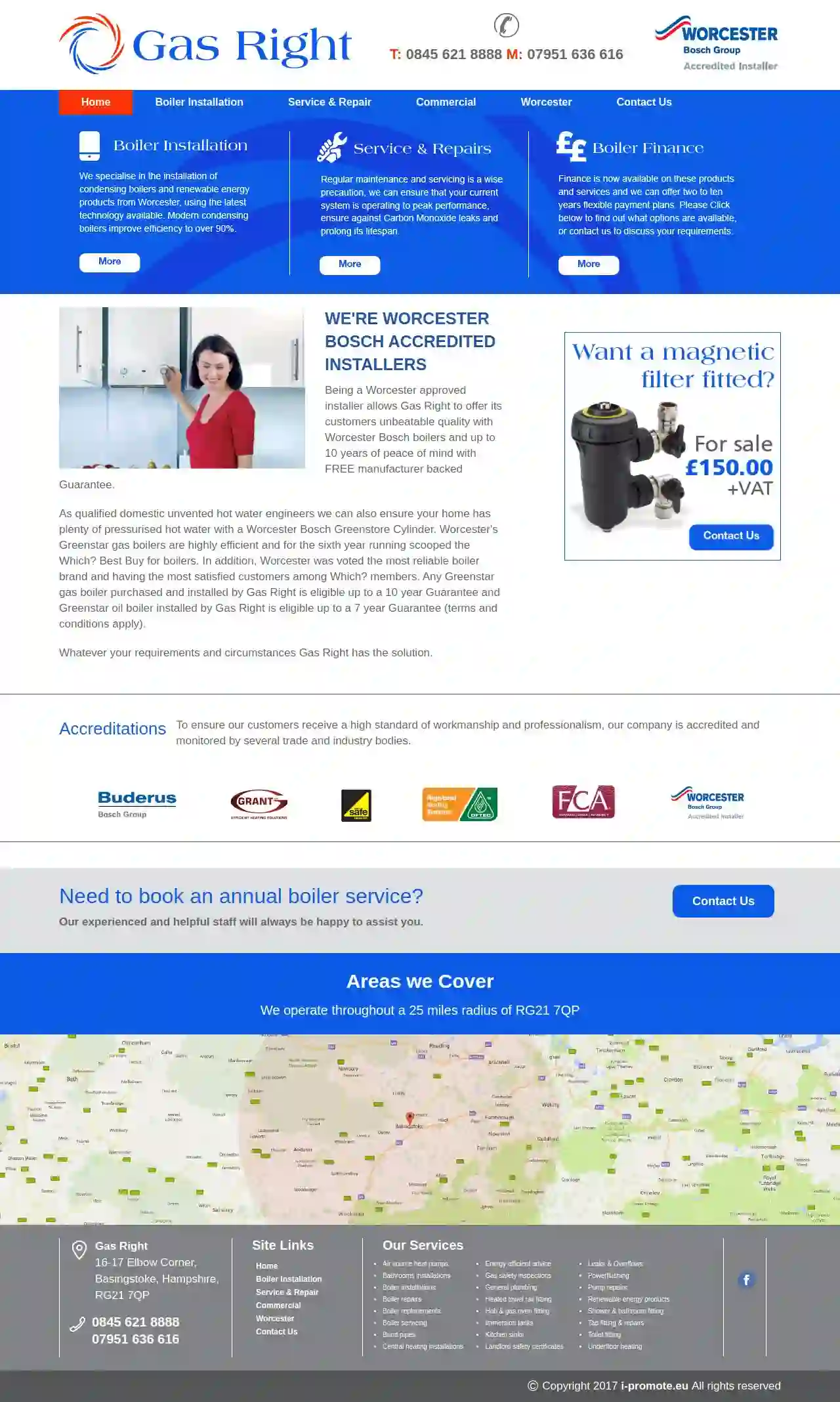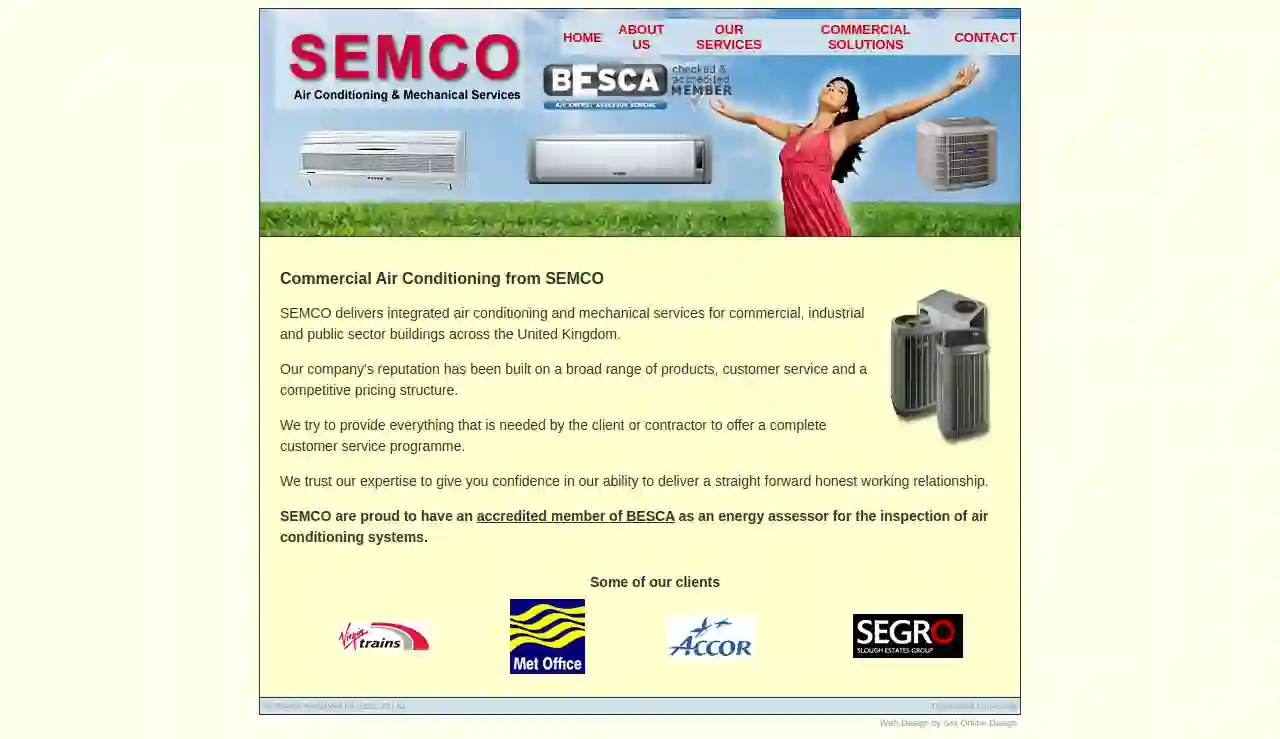Furnace Repair Basingstoke
Top 10 Furnace Service in Basingstoke
Receive multiple Heating Repair quotes for your project today! Compare profiles, reviews, accreditations, portfolio, etc... and choose the best offer.

Gas Right
3.410 reviews16-17 Elbow Corner, Basingstoke, RG21 7QP, GBGas Right is a Worcester Bosch accredited installer, offering high-quality boiler installations, services, and repairs. With over 25 years of experience, we provide unbeatable quality and up to 10 years of peace of mind with FREE manufacturer-backed guarantees. Our team of qualified domestic unvented hot water engineers ensures your home has plenty of pressurised hot water. We operate throughout a 25-mile radius of RG21 7QP, covering Basingstoke, Hampshire, and surrounding areas.
- Services
- Why Us?
- Accreditations
- Gallery
Get Quote
Semco Building Services Ltd
1Lutyens Close, Chineham Court, Grove House, Basingstoke, RG24 8AG, GBSemco Building Services Ltd has been developed over the years with a long-term commitment of our personnel to the Company. This is reflected by our results in obtaining continuing Customer Satisfaction with our technical expertise. From our conception we have set out to provide a quality operation to efficiently carry out the design, installation and maintenance projects within the building services sector. The office and management provide all necessary administrative back up and will assist our Customers by monitoring our level of service and coordinating the correct level of expertise to attend to our contractual obligations. We undertake a wide range of contracts, from small works to major capital projects. Our flexibility of operations, stems from the ability to assess the need and subsequently act quickly and decisively to meet the Client's needs. We aim to build a good working relationship with each of our Customers by providing a service tailored to their requirements.
- Services
- Why Us?
- Accreditations
- Gallery
Get Quote
Thermoflux Plumbing and Heating
59 reviewsBasingstoke, GBWelcome to Thermoflux Plumbing and Heating, servicing Basingstoke and surrounding areas. Trained to the highest standards, comprehensively insured, Gas Safe and National Vocational Qualification accredited, we are confident in our ability to provide all customers with the finest plumbing & heating services within a 20 mile Radius of Basingstoke. Our mission is to provide a stress-free experience at the complete satisfaction of each valued customer.
- Services
- Why Us?
- Accreditations
- Our Team
- Testimonials
- Gallery
Get Quote
Over 1,991+ HVAC Companies on our directory
Our HVAC pros operate in Basingstoke & beyond!
HVACCompaniesHub has curated and vetted the Best HVAC Companies in Basingstoke. Find a reliable pro today.
Frequently Asked Questions about Furnace Repair
- Lack of power: Check the circuit breaker to ensure the furnace is receiving power. A tripped breaker is a common and easily resolved problem.
- Thermostat problems: Check that the thermostat is set correctly to 'heat' and at a temperature higher than the current room temperature. Replace batteries if the display is blank or not working. Try resetting the thermostat or replacing the batteries. If that doesn't solve the problem, the thermostat may need to be replaced.
- Clogged air filter: A clogged air filter can cause many problems. Try replacing the filter.
- Ignition problems: The igniter or pilot light (in older furnaces) is responsible for lighting the burners. In newer furnaces, electronic ignition systems control this process and should be checked if there are problems.
- Blower motor issues: The blower motor is crucial to distributing warm air throughout your home. If the blower motor is broken, the furnace may not produce enough heat.
- Gas supply problems (for gas furnaces): Gas furnaces require both gas and electricity to function properly. Check that there are no gas leaks.
- Other component failures: Other components, such as the inducer motor, capacitor, or pressure switch, might be responsible.
What is a heat exchanger in a furnace?
What causes a furnace to stop working?
How often should I change my furnace filter?
What is a pilot light?
What is a heat exchanger in a furnace?
What causes a furnace to stop working?
- Lack of power: Check the circuit breaker to ensure the furnace is receiving power. A tripped breaker is a common and easily resolved problem.
- Thermostat problems: Check that the thermostat is set correctly to 'heat' and at a temperature higher than the current room temperature. Replace batteries if the display is blank or not working. Try resetting the thermostat or replacing the batteries. If that doesn't solve the problem, the thermostat may need to be replaced.
- Clogged air filter: A dirty air filter can cause many problems. Try replacing the filter.
- Ignition problems: The igniter or pilot light (in older furnaces) is responsible for lighting the burners. In newer furnaces, electronic ignition systems control this process and should be checked if there are problems.
- Blower motor issues: The blower motor is crucial to distributing warm air throughout your home. If the blower motor is broken, the furnace may not produce enough heat.
- Gas supply problems (for gas furnaces): Gas furnaces require both gas and electricity to function properly. Check that there are no gas leaks.
- Other component failures: Other components, such as the heat exchanger, flame sensor, control board, or limit switch, can also cause furnace malfunctions..